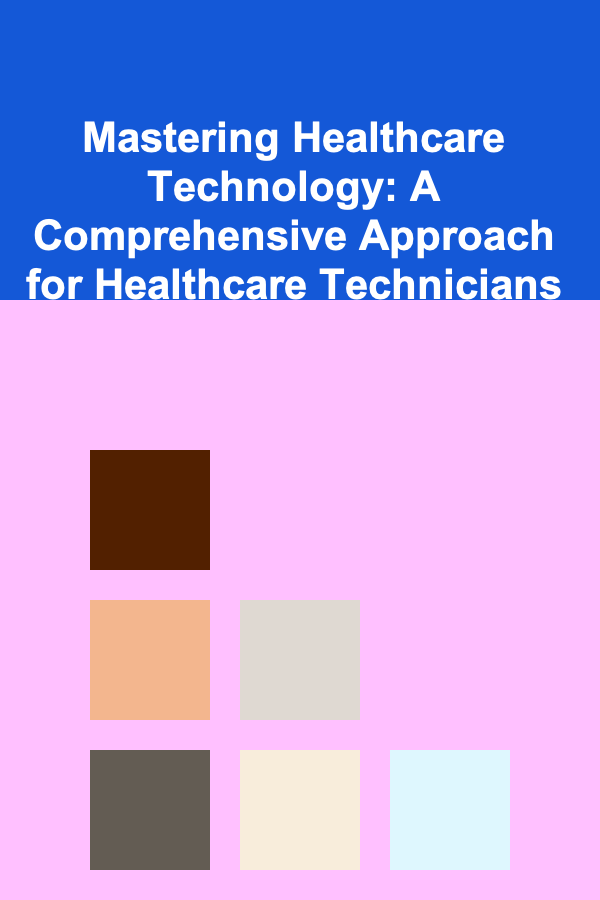
Mastering Healthcare Technology: A Comprehensive Approach for Healthcare Technicians
ebook include PDF & Audio bundle (Micro Guide)
$12.99$9.99
Limited Time Offer! Order within the next:

In the modern healthcare environment, technology is not just a support tool but an integral part of delivering effective, efficient, and high-quality patient care. Healthcare technicians are the backbone of this technological infrastructure, ensuring that medical equipment, systems, and processes run smoothly. With rapid technological advancements, it is crucial for healthcare technicians to not only understand how to operate the technology but also to stay ahead of the curve by mastering it.
This comprehensive guide provides healthcare technicians with actionable steps and in-depth strategies to master healthcare technology and stay effective in an increasingly tech-driven environment.
Understanding the Role of Healthcare Technicians in the Technology Landscape
Healthcare technicians work with a wide variety of medical equipment, from diagnostic tools like MRI machines and EKGs to life-saving technologies such as ventilators and pacemakers. Their role is evolving beyond routine maintenance and troubleshooting to encompass a broader understanding of how technology impacts patient care and overall healthcare operations.
Key Responsibilities:
- Equipment Maintenance and Calibration: Ensuring that medical devices are operating at optimal performance, meeting required standards, and being regularly calibrated.
- Troubleshooting and Repair: Diagnosing issues with equipment and systems, fixing malfunctions, and ensuring minimal downtime.
- Software and Systems Management: With the rise of Electronic Health Records (EHR), healthcare technicians need to be adept at managing software systems, securing patient data, and resolving technical issues related to digital health tools.
- Training Healthcare Providers: Educating medical staff on how to use new technologies effectively and troubleshoot minor issues to improve workflow.
Mastering these responsibilities involves continuous learning and the application of both technical expertise and an understanding of how technology can enhance patient care.
Staying Current with Technological Advancements
Healthcare technology is constantly evolving, with new systems, equipment, and techniques emerging regularly. As a healthcare technician, it's important to stay up to date with these developments to ensure the equipment you're responsible for is cutting-edge and operating at peak efficiency.
Key Actions:
- Participate in Ongoing Training and Certification Programs: Take advantage of certifications from recognized bodies such as the Association for the Advancement of Medical Instrumentation (AAMI) or the Biomedical Equipment Technician (BMET) certification. These programs offer in-depth knowledge on current technologies and emerging trends.
- Engage in Online Courses and Webinars: Platforms like Coursera, edX, and MedTech provide courses specifically designed for healthcare professionals. They can offer insights into emerging technologies like artificial intelligence (AI), telemedicine, and robotic surgery systems.
- Attend Conferences and Workshops: Conferences are a great way to stay in touch with experts and peers. They provide insight into new technologies, industry standards, and the future direction of healthcare technology.
Example:
For instance, AI-driven diagnostic tools like those used in radiology are becoming increasingly prevalent. Understanding how these tools work and their implications for patient care will allow technicians to troubleshoot these systems effectively and ensure their proper integration into healthcare workflows.
Mastering Key Healthcare Technologies
There are a wide array of technologies that healthcare technicians must be proficient in. From managing patient records to operating advanced diagnostic tools, mastering these technologies can significantly improve patient care and operational efficiency.
3.1 Electronic Health Records (EHR) Systems
EHRs are integral to modern healthcare, providing a digital version of a patient's medical history. Technicians play a crucial role in ensuring that these systems are functioning properly, secure, and easy for healthcare providers to use.
Key Actions:
- Learn EHR Software: Familiarize yourself with the leading EHR platforms such as Epic, Cerner, and Allscripts. Understanding their interfaces, functionalities, and troubleshooting procedures will help you assist healthcare providers in resolving issues quickly.
- Understand Data Privacy and Security: With the increased digitization of patient records, protecting patient data is a top priority. Learn about compliance standards like HIPAA (Health Insurance Portability and Accountability Act) to ensure that systems remain secure and protected from data breaches.
3.2 Medical Imaging and Diagnostic Equipment
Technicians in radiology departments are responsible for maintaining and operating diagnostic imaging equipment like MRI machines, CT scanners, and ultrasound devices. These machines require precision and expertise to ensure accurate diagnosis and patient safety.
Key Actions:
- Master Equipment Calibration: Learn how to properly calibrate equipment to ensure high-quality images and accurate diagnostic results. This includes adjusting settings like contrast, resolution, and radiation doses to meet industry standards.
- Troubleshooting: Understanding common issues like imaging errors or malfunctions and knowing how to fix them without compromising the quality of patient care is crucial.
3.3 Robotic Surgery Systems
Robotic surgery systems, such as the da Vinci Surgical System, are changing the way surgeries are performed. Healthcare technicians must ensure these machines are calibrated, maintained, and functioning smoothly.
Key Actions:
- Technical Understanding of Robotics: Gain an understanding of the mechanical and software components of robotic systems. This involves both understanding the surgical applications and ensuring that the system operates within the specified parameters.
- Regular Maintenance and Calibration: Robotic systems require frequent maintenance to ensure they remain functional and accurate. Technicians should be well-versed in system checks, performance assessments, and handling software updates.
3.4 Telemedicine Platforms
Telemedicine is expanding as a way to offer healthcare remotely, and it requires sophisticated software and hardware systems. Healthcare technicians are essential in ensuring the technology functions smoothly.
Key Actions:
- Learn Telehealth Technologies: Familiarize yourself with platforms such as Teladoc, Amwell, and MDLive. These systems rely on video conferencing, secure data transfer, and remote monitoring.
- Monitor Connectivity and Security: Ensure high-quality video and audio for consultations, as well as secure data transmission to maintain patient privacy during virtual consultations.
Developing Soft Skills for Technology Mastery
While technical proficiency is key to mastering healthcare technology, soft skills also play a significant role in ensuring that technology is used effectively and that healthcare teams are supported. Healthcare technicians must possess strong communication, problem-solving, and organizational skills to be successful in their roles.
Key Actions:
- Effective Communication: You'll need to communicate complex technical issues in a way that is understandable to non-technical staff. This is especially important when training medical professionals or collaborating with IT departments.
- Adaptability: Healthcare technology is constantly evolving. Being adaptable and open to learning new systems will help you stay ahead of technological changes.
- Problem-Solving: Troubleshooting is often a critical part of your job. Being able to identify the root causes of problems quickly and efficiently will reduce downtime and improve patient outcomes.
Example:
When a medical team faces challenges with a malfunctioning diagnostic machine, you'll need to communicate the issue clearly, propose possible solutions, and resolve the problem promptly. Strong communication and problem-solving skills are critical here.
Collaboration with Other Healthcare Teams
Mastering healthcare technology also involves working closely with other departments and professionals, including IT teams, medical staff, and administrators. Collaboration ensures that all aspects of technology, from installation to training and troubleshooting, align with the needs of healthcare providers and patients.
Key Actions:
- Work Closely with IT: Many healthcare technologies rely heavily on IT infrastructure. Collaborating with IT specialists ensures that systems are properly integrated, data is securely stored, and updates are carried out efficiently.
- Provide Training and Support: Be a resource for healthcare providers. Offer regular training on new equipment, software, and technology processes, helping them understand how to use technology to improve patient care.
- Contribute to Workflow Optimization: Work with healthcare teams to optimize how technology integrates into daily operations. This could mean streamlining data entry or improving the efficiency of imaging technologies.
Prioritizing Patient Safety and Ethics
While healthcare technology can revolutionize patient care, it also raises concerns about patient safety, data privacy, and ethical considerations. Healthcare technicians must be aware of these issues and take steps to ensure that technology is used responsibly.
Key Actions:
- Understand Ethical Guidelines: Familiarize yourself with the ethical guidelines surrounding healthcare technology. This includes respecting patient confidentiality, using technology in ways that directly benefit patients, and understanding the limitations of certain systems.
- Stay Informed on Regulatory Compliance: Ensure that the technology you use complies with national and international regulations, such as HIPAA or FDA regulations for medical devices.
Conclusion
Mastering healthcare technology is no small feat, but it is an essential skill for healthcare technicians in today's evolving medical landscape. By staying current with technological advancements, mastering key healthcare technologies, and developing essential soft skills, you can significantly enhance your effectiveness and contribution to patient care.
By continuously investing in education, communication, and collaboration, healthcare technicians not only ensure that medical technologies are functioning optimally but also contribute to the broader goals of improving patient outcomes and advancing healthcare practices. The future of healthcare is undoubtedly intertwined with technology, and mastering it is key to being an effective healthcare technician.

How to Avoid Common Pitfalls in Geotargeting for Dropshipping Advertising
Read More
How To Build a Powerful Online Portfolio
Read More
How to Keep Your Home's Indoor Plants Healthy Year-Round
Read More
How to Make Money Online as an Actor? 10 Actionable Ideas
Read More
How to Streamline Your Cleaning Routine with Minimal Supplies
Read More
How To Understand the Impact of Film Censorship
Read MoreOther Products

How to Avoid Common Pitfalls in Geotargeting for Dropshipping Advertising
Read More
How To Build a Powerful Online Portfolio
Read More
How to Keep Your Home's Indoor Plants Healthy Year-Round
Read More
How to Make Money Online as an Actor? 10 Actionable Ideas
Read More
How to Streamline Your Cleaning Routine with Minimal Supplies
Read More